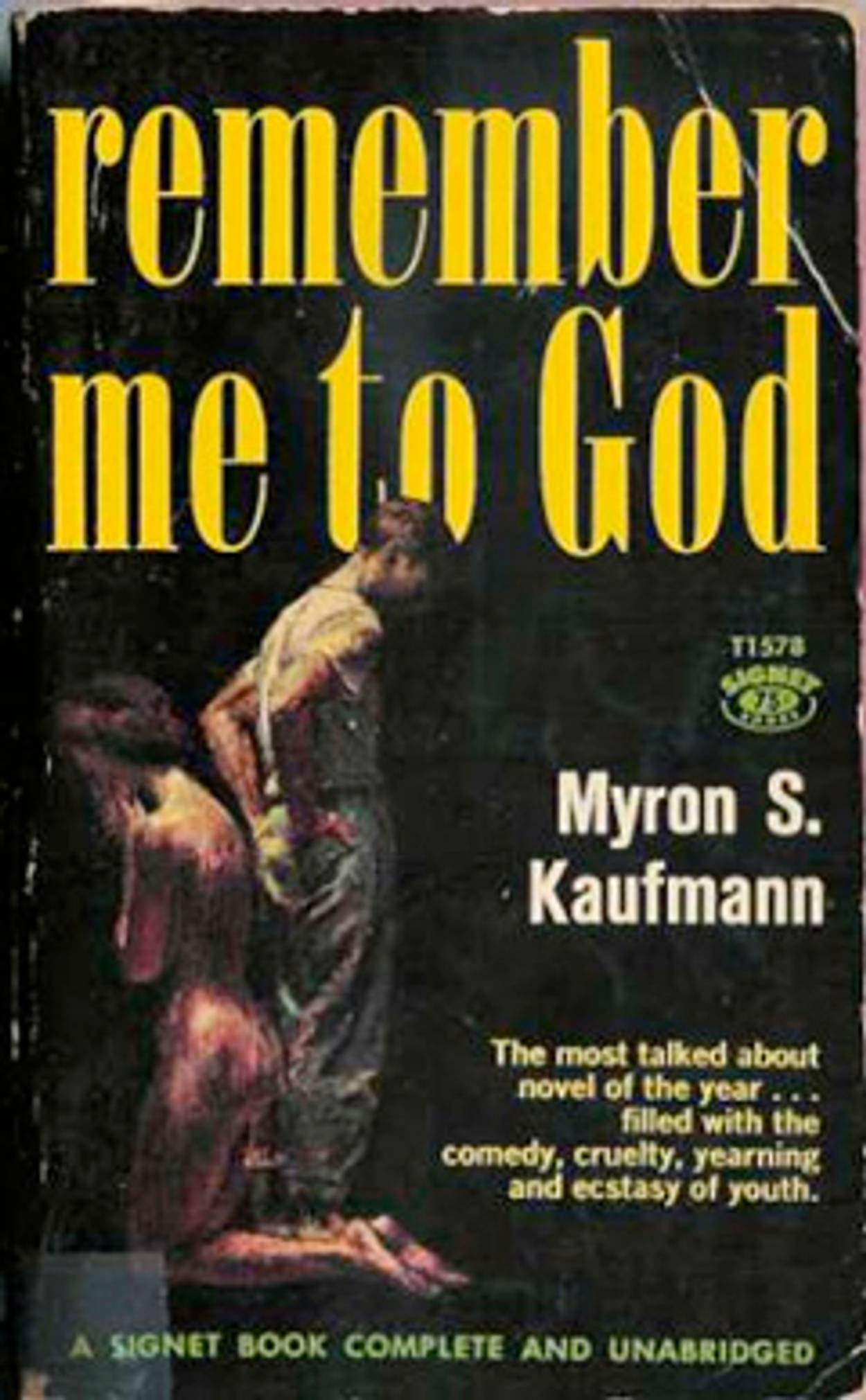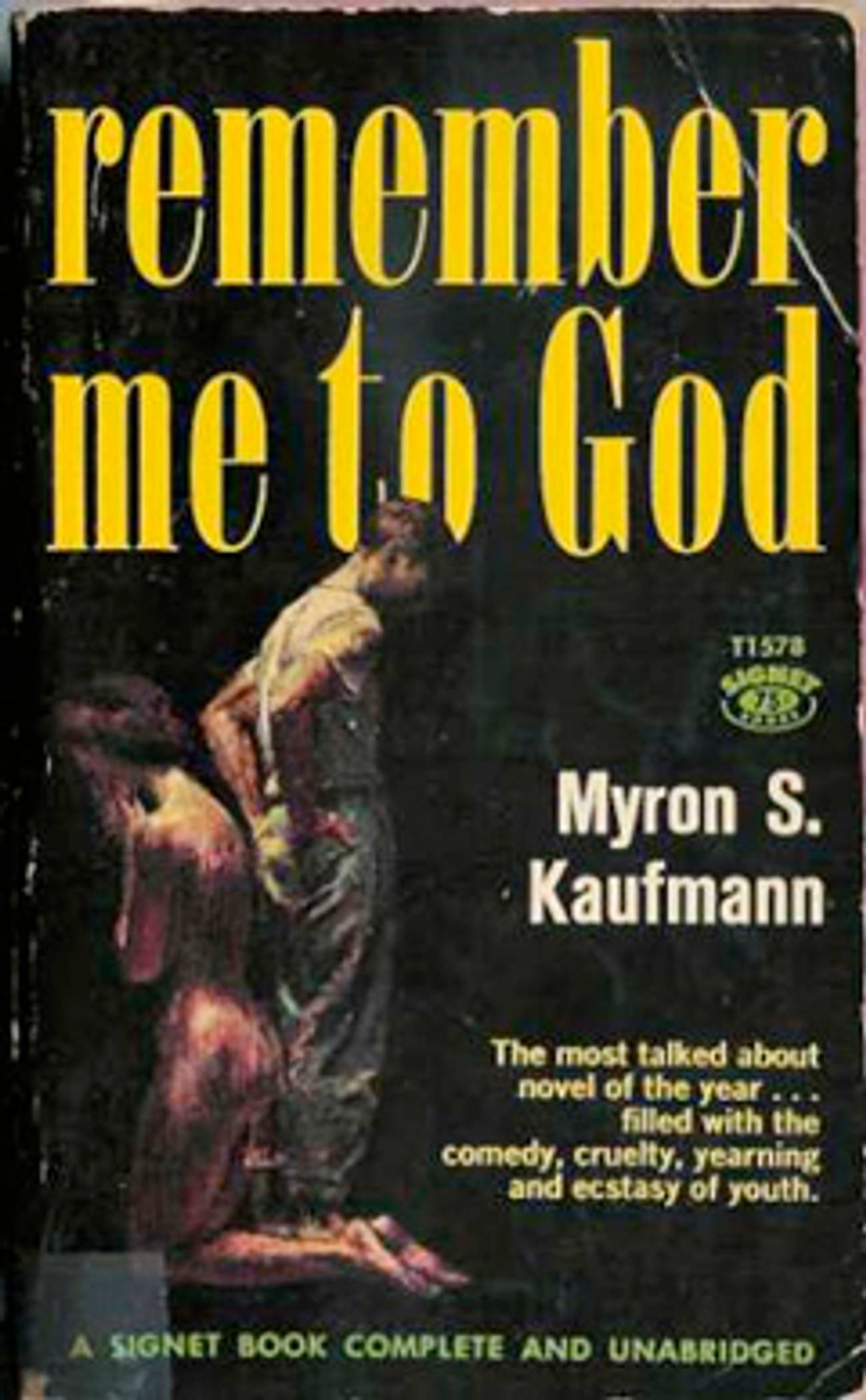Regatta Land
Amid Harvard’s ivy-covered bricks, the hero of Myron Kaufmann’s Remember Me to God struggles to become part of the in crowd




This month, Myron S. Kaufmann’s debut novel, Remember Me to God, turns 50, and so far there have been no signs of celebration. Though it was hailed on publication as one of the finest novels ever written about American Jews and remained on The New York Times bestseller list for an entire year, almost no one remembers it today. It goes unmentioned in bibliographies of American Jewish fiction, and so obscure is Kaufmann in this Internet age that searching for his name turns up nary a stub on Wikipedia.
Only by examining contemporary essays will you find references to Kaufmann’s novel. In 1959’s Advertisements for Myself, Norman Mailer proclaimed, “Of the novels about Jews which I have read, his is easily the best since Meyer Levin’s The Old Bunch,” a novel published two decades earlier. Mailer didn’t mention that Kaufmann had been his classmate at Harvard in the early 40s, or that Kaufmann had once dated his sister; but critics with no such vested interests and with greater authority, such as Alfred Kazin, were quick to second this assessment.
Remember Me to God details a year in the life of a Jewish family in Boston. When the novel opens, in 1941, Adam Amsterdam has risen from an orphanage to a legal career, a minor judicial appointment, and a home in well-to-do Newton—all thanks to the relentless hectoring of his wife, Bessie. Things should be wonderful for his family, but they’re not: Adam’s teenage daughter, Dorothy, lives an isolated existence, cut off from her classmates because of her tendency to stutter, while her brother Richard, a sophomore at Harvard, has much deeper problems.
Struggling to find a place for himself on a campus overrun with genius and seething with genteel anti-Semitism, Richard is drawn to the patrician culture of blue-blood Boston and to the college’s social organizations. Through a squash buddy, he lands a spot on The Harvard Lampoon, the comedy magazine and social club, and from there finagles election to the Hasty Pudding Institute of 1770, one of the oldest social organizations in the country, and a feeder for Harvard’s even snootier final clubs.
He soon proposes to a simpleminded Radcliffe first-year student named Wimsy Talbot, a Christian and genuine member of Boston society. The expected familial turmoil ensues, and ultimately Adam and Richard come to blows in the courtyard of a Harvard dorm.
Kaufmann brings a remarkable degree of psychological acuity to his representation of the family’s tortured relations, and his deliberate pace allows him to display behaviors developing almost microscopically: The novel reads, excruciatingly, like the emotional equivalent of a film of a car wreck played back in the slowest slowmotion.
Kaufmann’s subject itself isn’t, of course, terribly original. Half a century earlier, Ezra Brudno’s 1908 novel The Tether tracked a young Jew’s rise from immigrant peddler to Harvard student to suitor of a Baptist’s daughter, and anyone seeking stories about Jews and intermarriage probably skips Kaufmann, and Brudno, too, in favor of Ludwig Lewisohn’s somewhat-less-neglected classic The Island Within or Woody Allen’s Annie Hall. And of course even excellent books fall into obscurity all the time, no matter how popular they’ve been—particularly when, like Kaufmann’s, they spill out over nearly 700 pages of fine print.
With that in mind, what shocked me about Remember Me to God when I discovered it this spring was not that it isn’t better known, but simply that no one had ever thought to recommend it to me. I’m working on a PhD in American Jewish literature, and I’ve had advisors inside and outside of the academy as knowledgeable about the field as anyone on the planet. Most of these mavens know that, like Richard Amsterdam, I arrived at Harvard College some years ago, a middle-class kid from a traditional Jewish family, and that when I graduated my yearbook profile mentioned exactly two affiliations, precisely as Richard’s would have: the Lampoon and the Hasty Pudding.
My advisors couldn’t recommend Remember Me to God, though, because they hadn’t read it. By the time they were devouring American Jewish fiction, the book had already been dismissed by the critics of 1960s. Some Jewish leaders rejected the novel’s sexual frankness, but the most common objection was the one that equated Kaufmann with his protagonist and read the novel as a document of Jewish self-hatred.
Typical of these responses was an attack made by Rabbi David Seligson on Kaufmann, along with Philip Roth, at Manhattan’s Central Synagogue in June 1963. Seligson argued that such novelists paint a distorted and hateful picture of contemporary Jewish life. While Roth blasted back against Seligson in Commentary, Kaufmann didn’t mind the attention.
“There was this whole business of articles in Jewish publications and sermons about ‘Isn’t this terrible,’” Kaufmann, now 86, recalls. “People would hear these sermons and go out and read the book, and they liked it, and would recommend it to other people.” But as more and more critics refused to recommend the book, eventually word of mouth died down, and the novel disappeared.
Critics were not mistaken in reading Richard Amsterdam as a self-hating Jew. Their error was assuming that Richard’s views stood in for Kaufmann’s just because author and character attended Harvard during the same period. Richard, however, is the son of a butcher who became a judge, while Kaufmann’s father inherited a delicatessen and worked as a salesman. Richard grows up in Newton with a sister; Kaufmann is an only child whose parents struggled through the Depression across the river, in Arlington. At Harvard, the two young men could not have occupied more disparate social positions: While Richard is, however insecurely, a member of the Lampoon and Pudding—both organizations that in those years withheld membership from all but a few token Jews—Kaufmann sat on the editorial board of the daily Crimson, joined a less exclusive club called the Signet, and rowed crew. What would have mattered most to the Jewish leaders repulsed by Kaufmann’s depiction of a boy’s pursuit of a non-Jewish wife is that Kaufmann himself was no adherent of intermarriage: When asked in what ways his experiences as a young man differed from Richard’s, he replied, “I never dated a girl who was not Jewish.” Outside of his career as an author, which has produced two further novels, Kaufmann’s major activity has been his participation in the Orthodox community of Sharon, Massachusetts, which he helped found. As it turns out, then, Kaufmann had a lot less in common with his protagonist than I do—and not only when it comes to club memberships.
In my sophomore year at Harvard, I briefly dated a Cuban American classmate, but broke off the relationship after a week or two. I offered up the usual anti-intermarriage platitudes (“Sorry, I don’t date non-Jewish girls,” I told her), though not without feeling doubt, confusion, and guilt about doing so, for all the reasons Kaufmann enumerates in Remember Me to God. “Did it ever occur to you,” Richard asks his dad, “that it might be morally wrong to treat the human race as two different sets of animals that shouldn’t marry each other?” From there, it only got worse: In the spring, the campus literary magazine published a short story à clef I’d written in a furor of conflicted emotions and submitted for publication without so much as warning the girl. I hadn’t changed enough of the details to protect her from being identified with the story—which was satirical, surreal, and somewhat ham-handed—but enough so that the clear implication was that she and I had had sex, when in reality we barely kissed. She called me in a rage that summer, when word of the story got around to her, and much later told my roommate that the fall of her junior year had been ruined for obvious reasons.
My behavior may not have been quite as appalling as Richard’s—thankfully, I was never inspired, as he is, to author a handbook advising how classless Jews can behave like proper gentlemen, or to indulge in sexual fantasies about refugees from Nazi Germany—but it was regrettable enough. In Richard I see my own silly and pernicious self-involvement, my adolescent blindness to the fact that, whatever the stakes were for me in deciding whether or not I could comfortably date a non-Jewish woman, there was another party involved whose feelings I should have considered before working out such issues in public.
Of course, Kaufmann wasn’t describing my experience, or even my Harvard, really. As he noted at the time of his 25th class reunion in 1968, the school had changed in ways that would have been unimaginable in the 1940s, and by the time I arrived in 1997, Harvard had become a place where Jews of every stripe could profess their beliefs and opinions without fear of any consequences. Richard isn’t me any more than he is Kaufmann or anyone in particular—”I am pleased,” Kaufmann once wrote to his fellow alums, “that my classmates have been unable to identify the character as anyone we know”—but rather a fictional composite, and it is a testament to the author’s extraordinary skills that a figment of his imagination felt so palpable as to mislead otherwise sensible critics into reading the book as a thinly veiled autobiography. Remember Me to God is not an example of Jewish self-hatred, but rather a penetrating analysis of that phenomenon.
Why would a committed Jewish author devote hundreds of thousands of words to a detailed exposition of the lust of a Jewish boy for a gentile wife? The literary critic Leslie Fiedler offers a brilliant answer in an essay he published while Remember Me to God was still on the bestseller list (but which does not mention Kaufmann). Surveying the field of American Jewish writing—the “essential problems” of which, he says, are “identity and assimilation”—Fiedler notes that typically “it is in the role of passionate lover that the American-Jewish novelist sees himself…and the community with which he seeks to unite himself he sees as the shikse.”
This point holds true in everything from The Tether to Philip Roth’s 1969 hit, Portnoy’s Complaint (“to me…America is a shikse,” Portnoy declares). When authors or filmmakers—not only men, but also women like Emma Wolf or Anzia Yezierska; want to talk about what it means to be Jewish and American, they introduce a non-Jewish love interest into their narratives and let the passions and tensions of the romance stand in for the fraught relations between the two communities.
It is as an unusually evenhanded entry into this rich tradition that Remember Me to God deserves to be remembered, and as a finely wrought triumph of midcentury realism so precise in its observation that it captures perfectly the incline of streets in Harvard Square and the musty smell inside the Lampoon castle. I can’t say that reading it at 19 would have prevented me from embarrassing an innocent girl, but hopefully it would have made me a little more aware of the callousness of my actions. Remember Me to God remains, as Mailer wrote, a work of invaluable honesty, one that explores difficult terrain with perspicacity and confidence. Even given the peculiarities of literary history, I will venture to hope that it will be more widely read 50 years from now than it is today.
Josh Lambert (@joshnlambert), a Tablet Magazine contributing editor and comedy columnist, is the academic director of the Yiddish Book Center, Visiting Assistant Professor of English at the University of Massachusetts, Amherst, and author most recently of Unclean Lips: Obscenity, Jews, and American Culture.
Josh Lambert (@joshnlambert), a Tablet Magazine contributing editor and comedy columnist, is the academic director of the Yiddish Book Center, Visiting Assistant Professor of English at the University of Massachusetts, Amherst, and author most recently ofUnclean Lips: Obscenity, Jews, and American Culture.